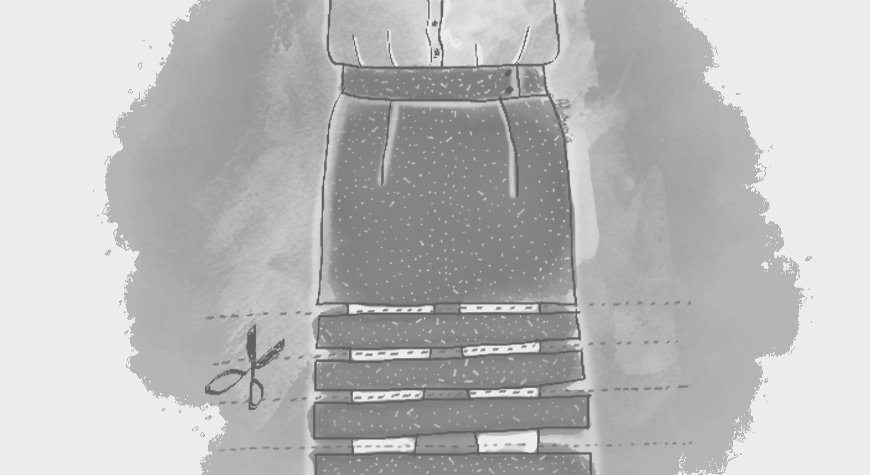I have roamed the earth long enough to collect comments and condemnation from strangers, colleagues and family members about how immoral I am based on the length of my skirts, the thickness of my red lipstick, and the various states that I wear my hair (i.e.: messy/tidy/loose/tied, uncovered).
Working in an institution whose very name flaunts a certain religion, I am bound to bump into matronly figures who eagerly point out that my shirt is so tight it makes me “look rather cheap”. They will quickly add that of course they know that I have not intended to look cheap on purpose, but it’s just the shirt. A morally upright woman just doesn’t wear a shirt unless it’s as loose as a tent.
I watch with envy as male colleagues saunter around the office dressed like sloths, shirts untucked and un-ironed, feet strapped in ugly sandals. No one in the whole office comments how morally wrong it is for a man to wear trousers with hemlines that hang a good 10 centimeters above their shoes, or five centimeters below their soles (making that maddening rustling sound they amble from cubicle to cubicle).
Things have not changed apparently. Many years ago, my dad begged me not to wear shorts in public because it didn’t suit a good girl like me. I was 11 and his entreaties turned me into a sulky girl. In this, he contradicted my mother, who encouraged my sisters and me to wear shorts and sleeveless shirts, because the weather in Jakarta was always too hot.
The weather, I’ve bitterly found, is the least of my concerns when it comes to dressing. After years of snide remarks about my alleged “mini” skirts, which actually cover my thighs but, alas, leave my thick calves to public view, I’ve resigned to wearing only skirts that cover my knees to work. Sleeveless tops are also not to be worn to the in-laws’ house, so as not to trigger a flood of prayers for my morality.
But I wouldn’t be as aggravated had they told me that certain clothes are not very flattering for my physique (i.e.: thick calves and chunky biceps to match), instead of implying that they are a reflection of my morality.
And then there’s the lipstick issue.
“Your lipstick is so bright it looks like you’re advertising yourself to men,” a much older female colleague, who obviously prefers nude colors for her lips, told me once.
“I make a point to wear lipsticks to match the tone of a fire-engine, yes,” I replied, adding that fire engines were allowed to cut queues in traffic jams.
But my favorite comment yet on this subject is one made by a male friend: “Women shouldn’t wear lipstick. It is morally wrong as it makes their lips look too similar to a vagina.”
Well, well, somebody has been thinking about vagina just a tad too much, hasn’t he?
And on the subject of hair, another amusing observation by a male acquaintance: “A woman who doesn’t cover her hair is really begging for men’s attention. It makes them look cheap.”
(Male readers, let me let you in on a little female secret: Women wear their hair a certain way for a gazillion of reasons. To catch men’s attention is just one of them, and to look like Kate Middleton is another. Perhaps the more important reason, however, is to attract the attention of other women.)
I have confidence that all, or at least most, women—pious or otherwise—have enough sense not to wear shiny tights to work. If a woman chooses to wear them to the nearest convenience store, then by all means, play fashion police as you like. But to brand her a sinner because she bares the shape of her thighs underneath those sparkly leggings is just wrong and unfair.
That said, I understand that for many Indonesians, and in some areas, a woman’s body is something to be regulated either by religious-inspired local laws or the traditional norms. And, yes, dressing for the occasion helps avoid unwanted incidents.
Whenever I have to take public transport, for instance, I wear trousers instead of a skirt. Besides practicality, I am just not too crazy about being stared at by the Metro Mini driver.
“When in Indonesia, dress like the Indonesians,” a colleague once remarked.
While I generally agree, I do hope he will never show up in the office wearing a sarong.
The thing is Indonesians wear all kinds of clothes—or none at all save a koteka—and no clothes will morally fortify you, if you have no morals to begin with. We should really stop judging others by how they choose to dress. Let’s start small: stop branding women based on the length of their skirts, or whether or not they wear headscarves.
Because this an irony all too familiar for us: As the latest of a series of women in headscarves come under investigation for corruption in Indonesia, another one’s decency is being questioned simply because her lipstick is too red, her pants are too tight and her hair is too loose, regardless of the fact that she could be a scientist working on a cure for AIDS.
About Lydia Iskandar
Lydia lives in the morally upright city of Serpong, Indonesia. While her sleeveless tops never see the light of day, she believes her purpose on earth is to prove that having slim legs isn’t a prerequisite to wear short skirts in public.








Comments